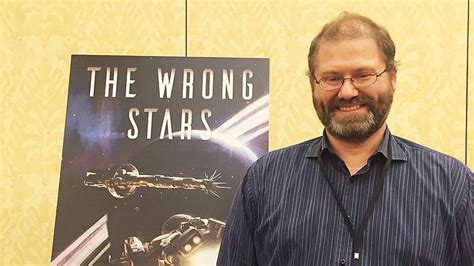A Quote by Brian Greene
We do not know whether there are extra dimensions or multiverse. Let's go forward with the possible ideas that come out of the mathematics. It's hard for us to imagine a universe that would have no time at all.
Related Quotes
It’s hard to build models of inflation that don't lead to a multiverse. It’s not impossible, so I think there’s still certainly research that needs to be done. But most models of inflation do lead to a multiverse, and evidence for inflation will be pushing us in the direction of taking [the idea of a] multiverse seriously.
If I became lost in the multiverse, exploring infinite parallel dimensions, my only criterion for settling down somewhere would be whether or not I could find you: and once I did, I'd stay there even if it was a world ruled by giant spider-priests, or one where killer robots won the Civil War, or even a world where sandwiches were never invented, because you'd make it the best of all possible worlds anyway, and plus we could get rich off inventing sandwiches.
I don't want to convince you that mathematics is useful. It is, but utility is not the only criterion for value to humanity. Above all, I want to convince you that mathematics is beautiful, surprising, enjoyable, and interesting. In fact, mathematics is the closest that we humans get to true magic. How else to describe the patterns in our heads that - by some mysterious agency - capture patterns of the universe around us? Mathematics connects ideas that otherwise seem totally unrelated, revealing deep similarities that subsequently show up in nature.
Well, we think that time "passes," flows past us, but what if it is we who move forward, from past to future, always discovering the new? It would be a little like reading a book, you see. The book is all there, all at once, between its covers. But if you want to read the story and understand it, you must begin with the first page, and go forward, always in order. So the universe would be a very great book, and we would be very small readers.
Never did I want to call the first time-out during a game. Never. I wanted UCLA to come out and run our opponents so hard that they would be forced to call the first time-out just to catch their breath. At that first time-out the opponents would know, and we would know that they knew, who was in better condition. This has a psychological impact.
Every story has a point of view and whether it's by what one chooses to include or exclude from a story or whether it's a very specific agenda that is pushed, there is no such thing as objective media. Once you realize that it's more than just a marketplace of ideas, it's a battleground of ideas that are suppressed and the ideas that are pushed forward in the mainstream media are the ones that independent media has a chance to address. I think that the democratization of media in that way can be very helpful in allowing the truth to come out in a way that it might not on CNN or FOX.

































